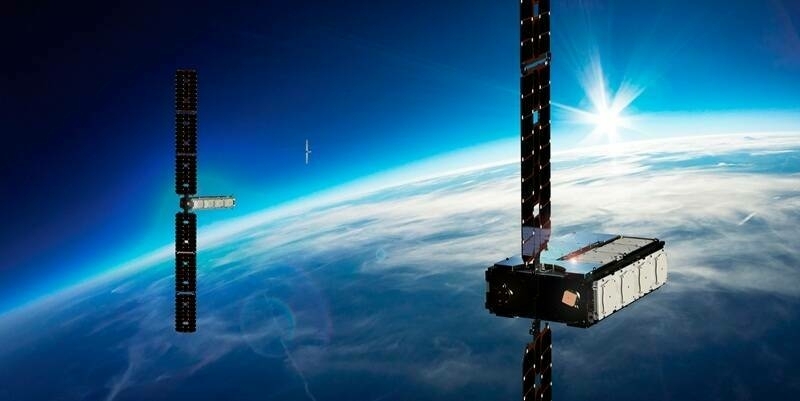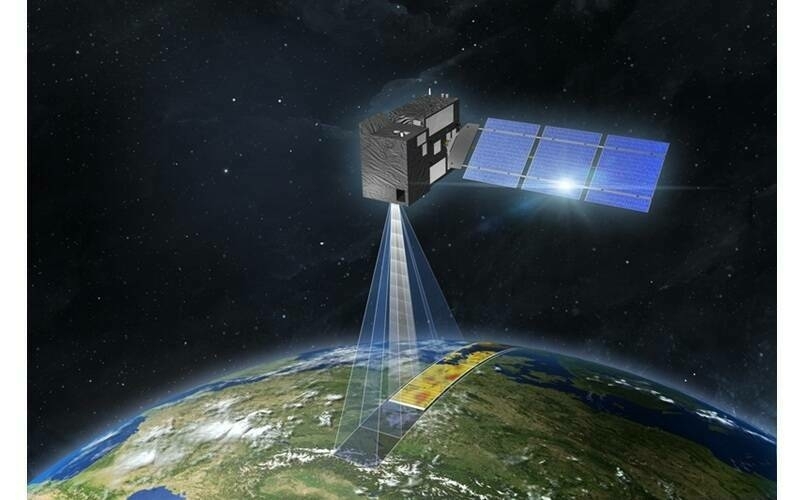Surrey Satellite Technology Ltd (SSTL) has confirmed the successful launch of two satellites, NovaSAR-1, a Synthetic Aperture Radar (SAR) satellite, and SSTL S1-4, a high resolution optical Earth Observation satellite. The two satellites were launched into a 580km sun-synchronous orbit on board the PSLV launch vehicle from the Satish Dhawan Space Centre in Sriharikota, India on 16 September at UTC 16:38 by Antrix Corporation Limited, the commercial arm of the Indian Space Research Organisation.
Sir Martin Sweeting, Executive Chairman of SSTL, said “I am pleased to confirm that successful contact has been made with both satellites and they are in good health. I would like to thank the Indian Space Research Organisation and Antrix for a successful launch which achieves our long-held ambition to deliver low cost SAR remote sensing capabilities and services to our global customers and enhances our Earth observation capabilities with a sub one metre optical mission.”
NovaSAR-1 is the first SAR spacecraft to be manufactured entirely in the UK and is a technology demonstration mission designed to test the capabilities of a new low cost S-Band SAR platform. NovaSAR-1 will be the world’s first commercial SAR satellite to be operated at a 10:30 equator crossing time, providing time diversity for radar observations by affording increased daylight imaging opportunities in addition to night acquisitions. Synthetic Aperture Radar is a powerful tool for monitoring the Earth from space due to its ability to see through clouds and image the Earth night and day, and a constellation of three NovaSAR satellites could image any point on the globe every day, regardless of local time or weather.
Mission partners signed up for capacity from NovaSAR-1 include the UK Space Agency, Australia’s Commonwealth Scientific and Industrial Research Organisation (CSIRO), and the Indian Space Research Organisation (ISRO).
The UK Space Agency has invested £21M in the development of NovaSAR-1 and will benefit from access to data from the spacecraft, significantly boosting the UK’s sovereign Earth observation capabilities and leveraging additional inward investment to the UK by creating highly skilled jobs in the UK space industry, and stimulating the growth of data analysis services.
Science Minister Sam Gyimah said: “The data from this satellite, backed by a £21 million investment from the Government, will help innovative start-ups develop new apps that could revolutionise the way we live. It’s a great example of how we are working with the space sector through our modern Industrial Strategy, ensuring we remain at the forefront of pioneering science and exploration.”
Minister of State for the Department for International Trade, Baroness Fairhead, said:
“SSTL is a fantastic example of how UK innovation and engineering can have a global impact. It is clear that our space industry is thriving, resulting in significant growth which reinforces the UK’s reputation as a leader in the sector.”
Dr Dave Williams, Executive Director of Digital, National Facilities and Collections at CSIRO, said “Through our share of NovaSAR-1 tasking and acquisition time we’ll extend the significant role CSIRO – Australia’s national science agency – already plays in managing a range of national research facilities. We’ll be making time on NovaSAR-1 available to Australian scientists. The satellite provides significant opportunities to support a wide range of existing research, further develop Australia’s Earth observation data analytics expertise, and create new opportunities in the field of remote sensing.”
NovaSAR-1 was designed and manufactured by SSTL, with an S-Band SAR payload developed by Airbus Defence and Space in Portsmouth and an Automatic Identification Receiver supplied by Honeywell Aerospace. The SAR payload has a dedicated maritime mode designed with a very wide swath area of 400km to enable the monitoring of the marine environment, and will provide direct radar ship detection information simultaneously with AIS ship tracking data to assist with the identification and tracking of sea-going vessels. In addition to operating in maritime mode, NovaSAR-1 has been optimised with three additional imaging modes, including a six metre resolution imaging mode, for a range of other applications, such as flood monitoring and agricultural and forestry applications. The satellite has been designed to offer a high throughput of data, observing in a variety of polarisation combinations to additional information to acquisitions in the form of ‘colour’.
SSTL S1-4 satellite is a sub one metre Earth observation satellite identical in design to the three DMC3/TripleSat Constellation satellites launched in 2015. A contract to provide data from SSTL S1-4 was signed with Twenty First Century Aerospace Technology Co., Ltd (21AT) in February 2018. As manufacturer and owner of the satellite, SSTL will lease imaging capacity to 21AT for the lifetime of the satellite, designed to be in excess of 7 years. SSTL S1-4 will contribute sub one metre resolution image data into 21AT’s existing TripleSat Constellation service, comprising three SSTL DMC3 satellites launched in 2015. SSTL S1-4 is capable of acquiring multiple targets in one pass, utilising spot, strip and mosaic imaging modes and 45 degree off-pointing agility for a range of applications including urban planning, agricultural monitoring, land classification, natural resource management and disaster monitoring. The very high resolution imager on board the spacecraft has been designed and manufactured by SSTL and will acquire sub one metre resolution images in panchromatic mode and sub four metre resolution images in multispectral mode, with a swath width of about 24km.
The systems on board both satellites are being commissioned in orbit from SSTL’s Spacecraft Operations Centre in Guildford UK.
Subscribe to our newsletter
Stay updated on the latest technology, innovation product arrivals and exciting offers to your inbox.
Newsletter

